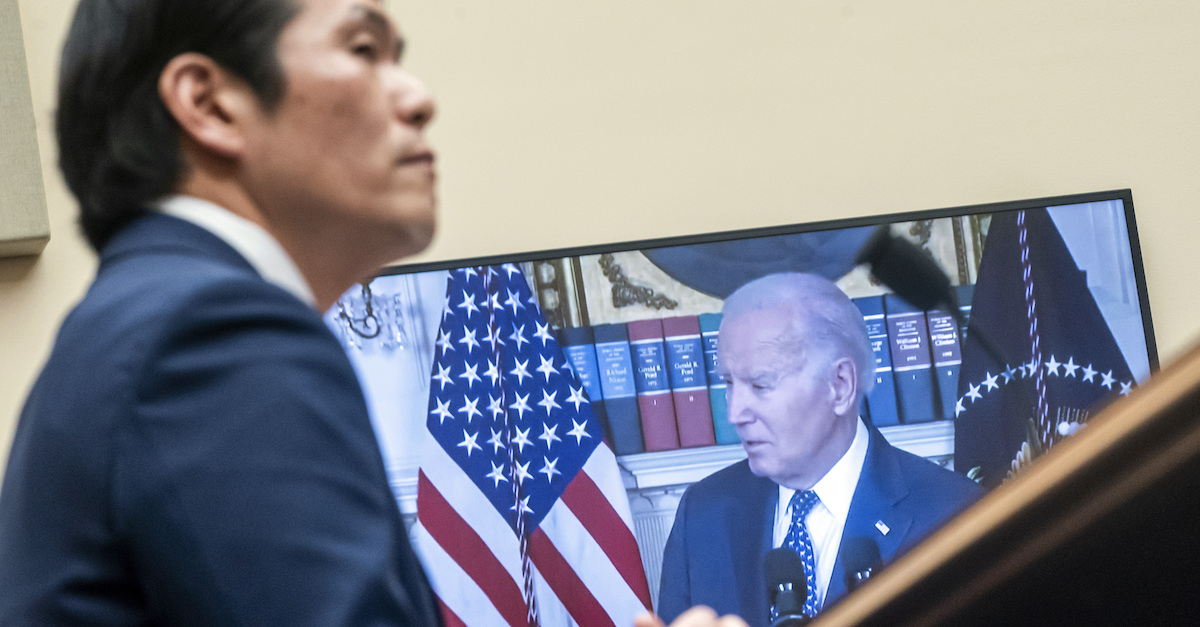
FILE – Special Counsel Robert Hur listens to recorded remarks of President Joe Biden during a hearing of the House Judiciary Committee in the Rayburn Office Building on Capitol Hill in Washington, March 12, 2024. (AP Photo/Nathan Howard, File)
As a fight to obtain audiotapes of Joe Biden’s five-hour interview with special counsel Robert Hur carries on in court, both a coalition of mainstream media organizations and conservative groups agree that the 46th president should not be able to hide behind executive privilege and worries of “deepfakes” to avoid disclosure in the Freedom of Information Act (FOIA) case.
The Heritage Foundation, Judicial Watch, and the media coalition, composed of CNN, ABC, The Associated Press, CBS News, The Wall Street Journal, NBC, Reuters, and more, separately filed documents Friday opposing the motion for summary judgment that U.S. Attorney General Merrick Garland’s DOJ filed in late May.
The Heritage Foundation, calling this a “simple case despite the efforts of the Government to complicate it,” offered counterpoints to DOJ assertions that the public’s access to the transcripts of Hur’s Biden interview is more than sufficient in light of foreseeable “privacy harms.”
“While the transcript discloses spoken words (the ‘lexical’ portion of the interview), the audio recording is the only source of the ‘non-lexical’ portion that depicts the tone, tenor, cadence, pauses, hesitations, and other demeanor evidence of the interview,” wrote attorney Samuel E. Dewey. “As any junior trial lawyer can attest, a witness’s live recording speaks volumes more than a cold transcript of the same testimony.”
“Special Counsel Hur testified to Congress that he relied upon this ‘demeanor’ evidence to reach his controversial decision to recommend against criminal charges,” the filing continued.
When Hur released his report on the Biden investigation, noting that DOJ policy rules out charges against a sitting president, the special counsel said even though there was evidence Biden “willfully retained and disclosed classified materials” after his vice presidency, a jury wouldn’t want to convict the president, whom he called a “sympathetic, well-meaning, elderly man with a poor memory.”
The special counsel also said there was a marked difference between the alleged facts in the Biden case and those in former President Donald Trump’s Mar-a-Lago prosecution.
“Unlike the evidence involving Mr. Biden, the allegations set forth in the indictment of Mr. Trump, if proven, would present serious aggravating facts,” the Hur report said. “Most notably, after being given multiple chances to return classified documents and avoid prosecution, Mr. Trump allegedly did the opposite.”
The Heritage Foundation has since responded that a “desperate” DOJ relied on “numerous breath-takingly broad arguments” to “hide these audio recordings from the American public,” including arguments that forcing the release of the audio “would threaten critical law enforcement interests by chilling the potential cooperation of witnesses in current and future sensitive investigations.”
The DOJ, also citing the “privacy interests” of “uncharged individual” Biden, said there was an obvious risk that “malicious” actors would manipulate the audiotapes to create “deepfakes.”
But FOIA, Heritage maintained, allows “no exemption to withhold information simply because it may be politically embarrassing.” The conservative group, taking issue with the rationale behind AG Garland’s recommendation that Biden invoke executive privilege, included a declaration from former George W. Bush administration U.S. Attorney General Michael Mukasey.
Mukasey concluded that the asserting executive privilege in this case is “entirely unconvincing” and “flawed”:
I am a strong proponent of the President’s constitutional responsibility to assert executive privilege when necessary to protect sensitive information in the possession of the Executive Branch, including confidential information in law enforcement files, the disclosure of which could seriously compromise the Department’s ability to enforce the law. However, I believe the assertion of executive privilege made here goes well beyond the limits of any prior assertion and is not supported by the 2008 Executive Privilege Letter or other precedents relied upon by the Department. The reasons given for invoking the privilege are entirely unconvincing, and I believe that by pressing this flawed privilege assertion, the Department has lost sight of the true institutional interests of the presidency and is putting at risk the important traditions and principles on which the doctrine of executive privilege rests, and thus the ability of this and future Presidents to invoke that doctrine when necessary and appropriate.
The media coalition, for its part, had a similarly chilly reception for DOJ’s arguments against disclosure of a “historic record of a sitting President answering a federal prosecutor’s questions under oath.”
“No purported law enforcement, executive privilege, or privacy interest can outweigh the American public’s pressing interest in hearing that interview for ourselves,” wrote attorney Charles D. Tobin of the firm Ballard Spahr LLP.
The attorney warned that FOIA would be rendered meaningless if the president’s interview remains out of the public’s ear.
“While the Special Counsel has released a redacted written transcript of the President’s interview, that alone does not permit the public to ‘evaluate’ and if appropriate ‘criticize’ the Special Counsel’s determination of how a jury might assess Biden’s culpability,” the memorandum in opposition to DOJ said. “Release of the audio would allow the public to assess the demeanor of the interview participants, the tenor of their conversation, and their tone of voice, none of which can be discerned from a cold transcript.”
Importantly, the media coalition said, White House lawyers “flatly disputed” Hur’s descriptions of Biden’s memory, making the audio fair game for judging those defenses over the course of Biden’s reelection campaign — especially since there are no other means of evaluating those defenses in absence of the audiotapes.
“The Special Counsel and the White House clearly have divergent views as to the President’s mental acuity during the interview. But there is no dispute that Biden’s perceived acuity was a key factor in Hur’s charging decision, nor that Hur’s characterization of Biden became a political concern for the White House in this election year,” the media plaintiffs argued. “Without hearing the interview for itself, the public simply has no way of assessing who has the more accurate view.”
The “colossal public interest” in disclosing the tapes is plainly “at its zenith” and overrides purported privacy concerns, the filing continued.
And what about “deepfakes,” including one “currently circulating on social media purporting to be a leaked clip from the Recording?”
If the DOJ is so concerned about that, the filing said, it can release the real audiotapes and there will be a way to know who’s lying:
In sum, even if the risk of “deepfake” copies of the interview audio spreading were a factor in the Exemption 6/7(C) balancing test, that factor would further favor disclosing the real Recording rather than keeping it secret and leaving the public to wonder whether any given clip circulating online is real or artificial.
Have a tip we should know? [email protected]






